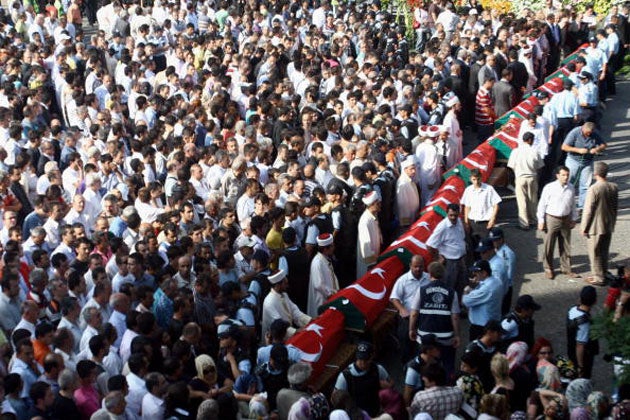Kurds are blamed for bombs that killed 17 in Istanbul

Your support helps us to tell the story
From reproductive rights to climate change to Big Tech, The Independent is on the ground when the story is developing. Whether it's investigating the financials of Elon Musk's pro-Trump PAC or producing our latest documentary, 'The A Word', which shines a light on the American women fighting for reproductive rights, we know how important it is to parse out the facts from the messaging.
At such a critical moment in US history, we need reporters on the ground. Your donation allows us to keep sending journalists to speak to both sides of the story.
The Independent is trusted by Americans across the entire political spectrum. And unlike many other quality news outlets, we choose not to lock Americans out of our reporting and analysis with paywalls. We believe quality journalism should be available to everyone, paid for by those who can afford it.
Your support makes all the difference.Turkish police are studying security camera footage of two men carefully placing white plastic bags in rubbish bins in their search for clues after two bombs exploded in a busy Istanbul suburb, killing 17 people. The blasts on Sunday evening further raised tensions in this divided country.
Nobody has claimed responsibility for the attack, the deadliest in Turkey's biggest city since more than 60 people died in four co-ordinated car bomb attacks on British and Jewish targets in November 2003. And the Kurdistan Workers Party, or PKK, has denied that it played any role in the blasts. Istanbul's Governor, meanwhile, linked the bombings to the PKK. "There appears to be a link with the separatist organisation," said Muammer Guler. And when the Prime Minister, Recep Tayyip Erdogan, visited the scene of the yesterday, crowds greeted him with shouts of "Down with the PKK". The PKK, whose war against the Turkish state has resulted in 40,000 deaths since 1984, has bombed Turkish cities in the past.
Analysts speculate that the PKK may have been seeking revenge for aerial and ground attacks against its bases in northern Iraq. "The group is weak," said Sedat Laciner, a specialist in terrorism. "I think it is trying to bring itself to the top of the agenda again." But those most affected by the bombs appear to be sceptical of the official Turkish media line. "They say it was the PKK," said Ibrahim Culhaci, whose wrecked shoe shop is metres from where the second, bigger blast occurred. "But everybody in this country is playing funny games. The PKK could just be a tool."
Suspicions centre on the nature of Sunday's explosions. The blasts were the first in Turkey in which one bomb appeared to have been used to attract a crowd which was caught by a second. Many of the victims were people who had rushed to help those injured in the first blast.
Nihat Ali Ozcan, a former army officer and terrorism specialist, insisted that the nature of the attack did not rule the PKK out: "That's a technique they could easily have learnt from insurgents in Iraq."
Others point out that the blasts came only hours before Turkey's top judges sat down to rule on the closure of the ruling Islamic party. But it also came two days after a criminal court accepted the indictment of an 80-strong secularist-nationalist gang, known as Ergenekon, which is accused of plotting to overthrow the government.
The group is allegedly linked to the murder of a judge in 2006. Its aim, according to the 2,500-page indictment, was to destabilise society in order to prepare the ground for a military coup.
Join our commenting forum
Join thought-provoking conversations, follow other Independent readers and see their replies
Comments